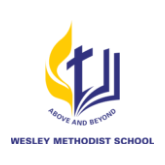Tracks
Parallel Session 1
Title: Implementing Interdisciplinary Project-Based Learning through Celebration of Learning (CoL): Teachers’ perspective
Speakers: Susan Tiang and Urish (WMSPI)
Synopsis:
This study investigates the effectiveness of grading codes and structured annotations in enhancing student comprehension of IGCSE First Language English rubrics. The primary goal is to offer practical, tier-specific guidance that aims to elevate the quality of student writing.
Through a careful analysis of rubric descriptors, the teacher identified specific, teachable steps that could be communicated to students. This led to the development of a system of annotations and codes designed to translate complex rubric criteria into student-friendly, actionable feedback.
Title: Unraveling Challenges through Problem Solving, Labelling, and Graphical Insight
Speakers: Shafizal, Pushpam, Kanimalar, Parveen (WMSKLI)
Synopsis:
This study focuses on improving student understanding of enzyme-related topics, particularly the active site and the lock-and-key hypothesis, which are fundamental concepts in biology, by addressing the issue of students who are unable to interpret command words such as explain, describe, suggest, and state.
Also, the study focuses on targeted interventions, including worksheet activities, online simulations, and hands-on model-building exercises. These strategies aimed to make abstract concepts more tangible and accessible. The discussion highlights both successes and areas for improvement, leading to recommendations such as differentiated instruction, focused remediation, and the integration of more IGCSE Paper 6 (Alternative to Practical) questions to enhance practical application skills.
Title: Teaching Area of Triangles and Developing Mathematical Thinking Skills with GeoGebra
Speakers: Chong Zhi Qing, Karen Esther, Vijaya Murthi (WMSII)
Synopsis:
This study examines the integration of technology in teaching mathematics with a focus on fostering mathematical thinking skills. It begins by discussing the current landscape of teaching and learning, emphasizing the role of technology in education to maximize its pedagogical potential. The study then explores the concept of mathematical thinking skills and investigates how these skills can be developed through the use of technology in the classroom.
Title: Innovative Approaches to Student Engagement: Shaping Character and Empowering Learning in the Digital Age
Speaker: Kavitsha Selvanayagam (WMSII)
Synopsis:
This study aims to explore and analyse various methods and strategies for enhancing student engagement, character building, and learning outcomes in the 21st century. It examines the effectiveness of modern teaching techniques, such as scaffolding and the integration of technology and ICT tools, in nurturing essential skills necessary for future success.
Additionally, the research highlights how creating an engaging and supportive learning environment not only fosters academic growth but also promotes the development of critical life skills, including problem-solving, collaboration, and digital literacy. By focusing on these areas, the study seeks to provide insights into effective pedagogical practices that can significantly impact students’ personal and professional futures.
Parallel Session 2
Title: Tutor Ward System: The What, Why and How
Speaker: Grace Niles (WMSKLI)
Synopsis:
This study examines the profound impact of the COVID-19 pandemic on middle and high school students, as well as their parents. It highlights how the pandemic disrupted academic progress, mental health, social development, and overall well-being for students, while also affecting parents’ emotional health, financial stability, work-life balance, and parenting dynamics.
In response to these challenges, the Tutor Ward System was developed as a comprehensive support framework aimed at ensuring that no student felt left behind or overlooked. The system also seeks to foster a strong partnership with parents, enabling them to actively support their child’s educational journey throughout their school years.
Title: Translating Rubrics into Actionable Feedback: Enhancing IGCSE English Writing through Grading Codes and Annotations
Speaker: Cheang Ai Nee (WMSPI)
Synopsis:
This study investigates the use of grading codes and structured annotations to bridge the gap between IGCSE First Language English rubrics and student understanding. Initially designed to support both lower-performing and high-achieving students, the method provides practical, tier-specific guidance for improving writing quality.
By analysing rubric descriptors, the teacher identified specific, teachable steps and developed a system of annotations and codes that translate complex criteria into student-friendly, actionable feedback. This approach encourages student reflection, independence, and enhances clarity regarding what constitutes effective writing, ultimately aiming to improve overall student performance in writing tasks.
Title: Algebraic Tiles: A CPA Approach to Understanding Algebra
Speaker: Joshua Ng Jin Ho (WMSII)
Synopsis:
This study explores the use of algebra tiles as part of the Concrete-Pictorial-Abstract (CPA) approach to enhance students’ understanding of algebraic transformations. The CPA framework, developed by Jerome Bruner, progresses from tangible objects (Concrete) to visual representations (Pictorial) and finally to abstract symbols (Abstract), helping students bridge the gap between concrete experiences and abstract reasoning.
By incorporating algebra tiles, the study aims to foster conceptual clarity and logical reasoning, making abstract algebra more accessible and meaningful. This approach emphasizes scaffolding and hands-on learning to deepen students’ understanding of mathematical concepts and improve their problem-solving skills.
Title: Designing and Implementing Effective Teaching Strategies for Chinese Language Classrooms
Speaker: Alex Yong Tsu Hing (WMSII)
Synopsis:
This project addresses the lack of student interest and initiative in traditional Mandarin instruction by implementing cooperative learning techniques to encourage more active participation. The study focuses on designing and implementing effective teaching strategies for Chinese language classrooms, aiming to create a more engaging and interactive learning environment. By fostering collaboration and engagement, the project seeks to enhance students’ motivation and improve their overall learning outcomes in Mandarin.
Parallel Session 3
Title: Intervensi Piramid Strategi Penjana Minda
Speaker: Mugilvaanan a/l Veeraseanan (WMSSP)
Synopsis:
This study focuses on developing effective teaching aids to assist Form 5 students in memorizing the formula for writing SPM essays through the use of a Pyramid Mind Strategy. It involves creating colourful pyramid-shaped cards designed to engage students and guide them in writing techniques, including:
- Techniques for crafting introductory paragraphs (THINK)
- Strategies for expanding content paragraphs (IMBAKUP)
- Methods for writing conclusion paragraphs (KECAHA)
- Appropriate discourse markers for starting the first sentence of the introduction
These teaching aids are designed to be user-friendly and formulaic, aiming to capture students’ interest and motivate them to learn and write essays effectively.
Title: Researching the Use of Graphic Organisers to Improve Students’ Persuasive Writing
Speaker: Marcus Oh (WMSKLI)
Synopsis:
This study investigates the significance of graphic organizers in helping Year 8 students improve their organization in persuasive writing. Using a pre-test post-test approach, students first write a persuasive essay without instructional support, which is graded using a Cambridge rubric. Following this, an instructional period introduces persuasive writing strategies with a focus on graphic organizers, providing students with practice, feedback, and revision opportunities.
The study aims to evaluate how graphic organizers enhance students’ ability to structure their arguments, improve clarity, and foster better writing outcomes. It highlights the potential of visual tools to bridge gaps in understanding and support effective learning in writing tasks.
Title: Empowering Students Through Entrepreneurship: A Sports Day Sales Project
Speaker: Wong Hin Chow (WMSII)
Synopsis:
This study highlights the impact of a hands-on entrepreneurship project conducted by business students during their school’s Sports Day. The project involved students running a small-scale business in a monopoly setting, selling Tom Yam noodles, ice cream, and beverages such as mineral water and carbonated isotonic drinks.
The initiative aimed to demonstrate how practical learning experiences can develop essential business skills, including financial literacy, inventory management, pricing strategy, and customer service. By engaging in real-world entrepreneurial activities, students gained valuable insights into business operations, fostering both practical skills and an entrepreneurial mindset. This symposium underscores the importance of experiential learning in preparing students for future business endeavors.
Title: Using Project-Based Learning to Enrich Literary Engagement in Bahasa Melayu and English Classrooms: A Form 3 Case Study
Speakers: Nur Farah Nabila Abd. Latiff, Raiza A Rahman, Sarvinthanraj Subramaniam (WMSKLP)
Synopsis:
This study is to find out the whether the introduction Project-Based Learning (PBL) in Bahasa Melayu and English classes will affect students’ engagement. Despite being taught in different languages, both classes explored similar themes such as conflict, family, and identity through various texts. Students worked collaboratively and responded creatively, producing projects like videos, posters, and digital presentations to showcase their understanding of the themes. The PBL approach empowered students to take ownership of their learning, contrasting with traditional methods that often led to passive learning and disengagement.
Parallel Session 4
Title: Enhancing Peribahasa Learning Through Animated Video Presentations
Speakers: Swarna Nair, Janet Savariapan & Izznusratina (WMSKLI)
Synopsis:
This study investigates the challenges faced by non-native Malay speakers in mastering peribahasa (Malay proverbs) and explores the effectiveness of using Powtoon, an animation-based video tool, to teach peribahasa interactively. Traditional memorization methods often fail to sustain engagement and comprehension, but Powtoon offers a dynamic and visually engaging alternative.
By leveraging animation and multimedia, the study aims to enhance students’ understanding and retention of peribahasa, making the learning process more enjoyable and effective. Findings from similar studies on Powtoon in language learning suggest that it can significantly boost student motivation and comprehension.
Title: Gamifying English lessons – spelling, phonics, grammar, comprehension
Speakers: Ho Yuen Ping & Ng Siew Wai (WMSII)
Synopsis:
This study emphasizes the importance of hands-on learning through games and activities that actively involve students in the educational process. By working within set time limits and collaborating in pairs or groups, students engage physically in planned activities, enhancing their learning experience.
The approach not only trains students to complete challenges and tasks set by the teacher but also encourages them to reflect on their performance and identify areas for improvement. This method fosters a more interactive and engaging classroom environment, promoting essential skills such as teamwork, communication, and critical thinking, ultimately leading to a deeper understanding of the material.
Title: A Comparative Assessment Study on Enhancing Student Engagement in Mathematics through the Gallery Walk Method: A 21st-Century Teaching and Learning Approach
Speaker: Rehvathy (WMSKP)
Synopsis:
This study addresses the lack of engagement and interest in Mathematics classes, particularly among weaker learners, by integrating student-centered teaching methodologies with a 21st-century learning assessment strategy: the gallery walk. The gallery walk involves students collaboratively solving mathematical problems in a dynamic and interactive environment, fostering active participation and teamwork. The study aimed to evaluate whether group-based problem-solving is effective across different levels of learners.
Title: Teaching Mandarin Vocabulary Using Collaborating Method
Speaker: Irene Khaw (WMSBSC)
Synopsis:
This study explores the effectiveness of contextual, interactive, and engaging language learning by teaching Mandarin vocabulary through the real-life topic of healthy and unhealthy food. Using a collaborative learning approach, students worked in groups to enhance their vocabulary retention, pronunciation accuracy, and sentence construction, while also increasing their awareness of food choices.
The study highlights how group-based learning fosters active participation and deeper engagement with the language. By connecting vocabulary to real-life contexts, students were able to better understand and retain the material, demonstrating the value of interactive and meaningful learning experiences in language acquisition.




